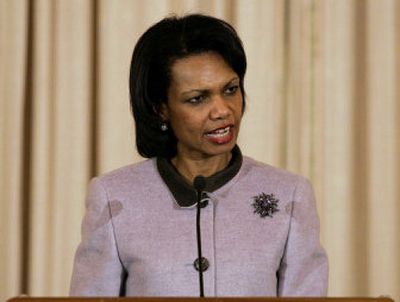Rice says Middle East changes inevitable

WASHINGTON – What many Americans may see as chaos and turmoil in the Middle East is partly the result of the Bush administration hastening historical forces that were destined to reshape the region, Secretary of State Condoleezza Rice said Tuesday. She added that the results will not be known for decades.
“The old Middle East was not going to stay,” Rice said. “Let’s stop moaning the old Middle East. It was not so great, and it was not going to survive anyway.”
Rice, in a year-end interview with a small group of newspaper reporters, emphasized the positive in a year that saw the radical Islamic groups Hamas and Hezbollah gain strength in the region, Iran shrug off international demands to suspend its nuclear program, and Iraq teeter on the edge of civil war. She attributed the setbacks to “counterrevolutionary forces” seeking to undo U.S. success in the region.
Rice, who frequently makes historical analogies, likened the current period to the challenges faced by the United States after the end of World War II. “Go back and put yourself in that time,” she said. There were “things that could have gone very badly and thrown the whole beginning of the Cold War in a completely different direction,” she said, ticking off the gains made by French communists, the civil war in Greece, the victory of Chinese communists and other foreign policy setbacks.
“Does it look that much better than it looks now in the Middle East? I don’t think so,” Rice said.
Rice insisted she was not being a Pollyanna. “I’m not arguing that it is just going great,” she said. “There are a lot of difficult places, of course, and some of these places teeter on the edge of really bad outcomes.”
But she argued American policymakers had long tolerated bad outcomes in the region for the sake of stability, including allowing Saddam Hussein to gas the Kurds, permitting the Syrian occupation of Lebanon, and Palestinian leader Yasser Arafat “stealing the Palestinian people blind” and cavorting with terrorism.
“Some of it … is that America challenged some of those old bargains, whether it was deciding that Saddam Hussein finally had to go or saying Yasser Arafat wasn’t a partner for peace, yes.” Rice said. “But that Middle East was going to break down, it had to break down. You weren’t going to continue to suppress all of these negative trends and so one way or another it was going to come apart.”